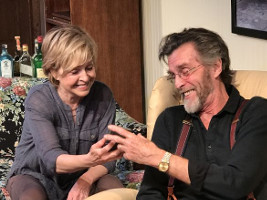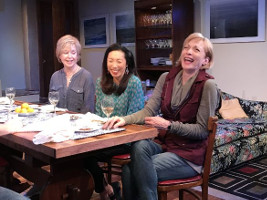|
Philip Dorian
STELLAR CAST IN WORLD PREMIERE
OF
“FERN HILL” IN NJ
 |
| Jill Eikenberry and John Glover |
Through September 9
New Jersey Rep, 179 Broadway, Long Branch.
Performances Thurs & Fri at 8PM; Sat at 3 & 8PM; Sun at 2PM.
For info and tickets ($50): 732-229-3166 or online at www.njrep.org
The six actors appearing at New Jersey Repertory Company in Long Branch
have amassed thirty-five Broadway credits among them, with six Tony
Award nominations (and a win) to boot. Lured to the 75-seat venue
by the prospect of creating roles in the world-premiere of a play
by another lauded actor-playwright, the deluxe half-dozen are a formidable
acting ensemble.
“Fern Hill” is Michael Tucker’s second full-length
play to premiere at NJ Rep, after “The M Spot” in 2015.
Like the earlier play, “Fern Hill” explores emotional
and physical (read: sexual) relationships, this time among three couples
– not as in swingers, I hasten to add, but three pairs with
their own histories and hang-ups.
The couples are gathered at Sunny (Jill Eikenberry) and Jerome’s
(David Rasche) farmhouse, Fern Hill, to commemorate the men’s
milestone birthdays: Vincent (John Glover) will soon be 80, Jerome,
known as Jer, 70, and Billy (Tom McGowan), 60. Including Vincent’s
wife Darla (Dee Hoty) and Billy’s wife Michiko (Jodi Long),
all are engaged in the arts and academia: painters and teachers, a
photographer, and, oh yes, Billy (“not a name for an adult person”)
plays bass in a fading reunion road band.
Over the course of an evening get-together, Sunny floats the idea
of a communal living arrangement at Fern Hill (named after a Dylan
Thomas poem), where the couples could all live and be there for one
another as they age. “We all get along great,” someone
says. “Precisely because,” says another, “we don’t
live together.”
Three-quarters into the first act, one of the characters drops a bombshell
concerning one of the others (no spoilers here). To Tucker’s
credit, the characters have been well enough established by then,
for the revelation to become the centerpiece of the play. As it develops,
all three marriages are affected.
Those marriages are diverse without being absurdly so. Vincent is
significantly older than Darla, a point made with the birthday comments
and, in case we were dozing, by his hip replacement surgery. Mr. Glover
captures curmudgeonly Vincent’s insecurity, and Ms. Hoty’s
Darla accepts, or at least is resigned to, the role of care-giver.
I suspect that Darla’s decision to attend her gallery opening
in Vienna pleases the women in the audience. (Mr. Tucker writes women
very well. He neither objectifies them nor patronizes them by making
them heroic.)
Billy is a middle-aged rocker, and Michiko is the younger woman he
met on tour. (Michiko’s Asian ethnicity is not a plot point.)
Billy’s constant wise-cracking, some funny enough, gets tiresome,
but Mr. McGowan’s timing cannot be faulted, and the character
is redeemed in the second act. (“You totally have the right
to remain silent. Carmen Miranda.”) McGowan is also particularly
moving when Billy stands silent during Michiko’s speech about
an accommodation she needed from her husband. It is the play’s
most tender moment, and Ms. Long expresses it perfectly.
Sunny is complex; she’s insecure, about her painting, yes, but
also about her aging allure and about some qualities she has sublimated
for years. She’s not helped by husband Jer, whose assumption
of superiority prompts him even to correct a minor slip in her grammar.
(He does this only once – in the play – but it is enough.)
The spouses circle around each other, none more realistically than
Sunny and Jer (wince); as enacted by Ms. Eikenberry and Mr. Rasche,
they reveal and withhold in equal measure until the group, er, communal
therapy takes hold. Even then, it’s unclear where they’ll
end up, which is fine; it is their business anyway, not ours.
Under director Nadia Tass, whose career has flourished in Australia
as well as in the US, the play takes on a sort of dual personality,
with six characters morphing into three units and back again. The
individuals are distinguishable, as are the couples. I doubt that’s
by accident. (And as usual, designer Jessica Parks captures the essence
of the piece, with several distinct playing areas on one unit set.)
 |
| from left, Jill Eikenberry, Jodi Long, Dee Hoty. |
“Fern Hill” is not overlong at just over
two hours, including intermission, but some pruning would put a tidy
cap on it. We get, for example, that Billy is a gourmet cook before
he details his elaborate clam sauce recipe, and there’s some
relationship-info repetition. That noted, plays that pose questions
are deeper than ones that purport to answer them; “Fern Hill”
is the former.
Will the gang-of-six turn Fern Hill into a commune? Tucker’s
play comes thisclose to answering that, but pulls back just in time.
More interesting is the question the audience is prodded to consider:
How many and how much of your deepest personal secrets would you openly
reveal in an effort to rescue a dear friend from a dire situation?
“I think when you hold secrets from a person you start not liking
them very much,” says one character. “Fern Hill”
is about opening up. To others, sure; but also to oneself.
|



